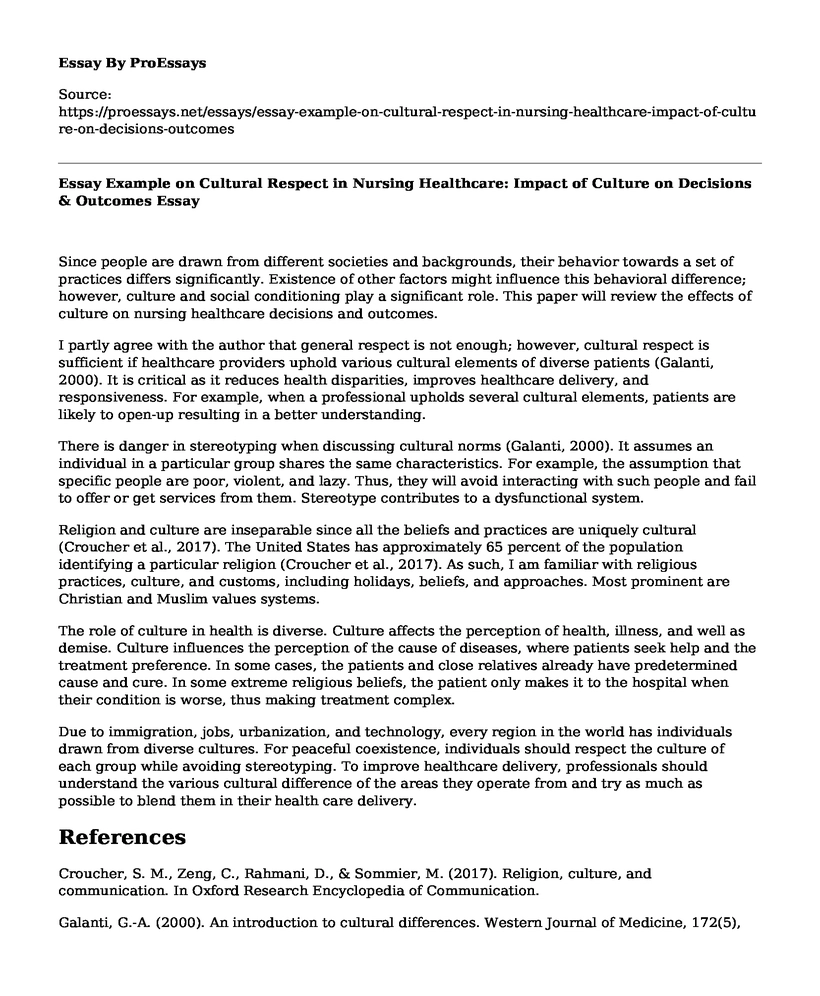Since people are drawn from different societies and backgrounds, their behavior towards a set of practices differs significantly. Existence of other factors might influence this behavioral difference; however, culture and social conditioning play a significant role. This paper will review the effects of culture on nursing healthcare decisions and outcomes.
I partly agree with the author that general respect is not enough; however, cultural respect is sufficient if healthcare providers uphold various cultural elements of diverse patients (Galanti, 2000). It is critical as it reduces health disparities, improves healthcare delivery, and responsiveness. For example, when a professional upholds several cultural elements, patients are likely to open-up resulting in a better understanding.
There is danger in stereotyping when discussing cultural norms (Galanti, 2000). It assumes an individual in a particular group shares the same characteristics. For example, the assumption that specific people are poor, violent, and lazy. Thus, they will avoid interacting with such people and fail to offer or get services from them. Stereotype contributes to a dysfunctional system.
Religion and culture are inseparable since all the beliefs and practices are uniquely cultural (Croucher et al., 2017). The United States has approximately 65 percent of the population identifying a particular religion (Croucher et al., 2017). As such, I am familiar with religious practices, culture, and customs, including holidays, beliefs, and approaches. Most prominent are Christian and Muslim values systems.
The role of culture in health is diverse. Culture affects the perception of health, illness, and well as demise. Culture influences the perception of the cause of diseases, where patients seek help and the treatment preference. In some cases, the patients and close relatives already have predetermined cause and cure. In some extreme religious beliefs, the patient only makes it to the hospital when their condition is worse, thus making treatment complex.
Due to immigration, jobs, urbanization, and technology, every region in the world has individuals drawn from diverse cultures. For peaceful coexistence, individuals should respect the culture of each group while avoiding stereotyping. To improve healthcare delivery, professionals should understand the various cultural difference of the areas they operate from and try as much as possible to blend them in their health care delivery.
References
Croucher, S. M., Zeng, C., Rahmani, D., & Sommier, M. (2017). Religion, culture, and communication. In Oxford Research Encyclopedia of Communication.
Galanti, G.-A. (2000). An introduction to cultural differences. Western Journal of Medicine, 172(5), 335-336. https://www.ncbi.nlm.nih.gov/pmc/articles/PMC1070887//
Cite this page
Essay Example on Cultural Respect in Nursing Healthcare: Impact of Culture on Decisions & Outcomes. (2023, May 30). Retrieved from https://proessays.net/essays/essay-example-on-cultural-respect-in-nursing-healthcare-impact-of-culture-on-decisions-outcomes
If you are the original author of this essay and no longer wish to have it published on the ProEssays website, please click below to request its removal:
- Health of Older Adults
- Poverty is Capability of Deprivation
- Reflection Paper: The Plague of Athens
- Essay Example on Gender Inequality in the Workplace: Examining HR as the Source
- Unpaid Internships: The Impact of Scholarships on Career Dev - Essay Sample
- Paper Example on Hospital-Acquired Pressure Ulcers: Causes & Risk Factors
- Essay on Using Best Practices to Improve Autism Treatment: A Look at the Autism Treatment Network







